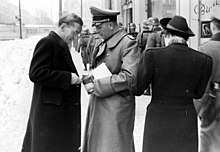Arthur Mülverstedt
Arthur Ferdinand August Mülverstedt (born June 30, 1894 in Gebesee ; † August 10, 1941 near Luga ) was a German lieutenant general in the police force and SS group leader at the time of National Socialism .
Life
The farmer's son Mülverstedt first attended elementary school in his hometown and then a high school in Erfurt , where he graduated from high school in March 1914 . He then joined the infantry regiment "von Horn" (3rd Rheinisches) No. 29 as a flag junior and from August 1914 took part in the First World War , first as platoon leader, then company and battalion leader . He was awarded several times and was discharged from the army with the rank of first lieutenant after the end of the war and entered the police force. First, he was captain in the security police in Berlin and later rose to the commander of the state police in Hannover with the rank of lieutenant colonel on.
Even before the " seizure of power " he joined the NSDAP in 1932 ( membership number 1,331,860). In March 1935 he switched to the Wehrmacht, where he was a staff officer of the 102nd Infantry Regiment and commander of the 68th Infantry Battalion. At the beginning of October 1936 he returned to the police force. At first he was the deputy inspector general of the Reich Schutzpolizei in the main office of the Ordnungspolizei and succeeded the previous incumbent in April 1937 in this position, which he held until March 1940.
On April 20, 1938, Mülverstedt was accepted into the SS (SS-No. 327.493) as SS-Oberführer and one year later reached the rank of SS-Brigadführer . In June 1940 he was promoted to lieutenant general in the security police and in November 1940 to SS group leader . After the " Anschluss of Austria " and the " smashing of the rest of the Czech Republic ", he also took on leading police functions in the "Ostmark" and the Sudetenland .
At the beginning of the Second World War he was in the wake of the 4th Army during the attack on Poland, commander of Police Group 5 and commander of the Ordnungspolizei (BdO) in the area of Army High Command 4. He was entrusted with the "cleansing" of Bromberg after the Bromberg Bloody Sunday . From March 1940 to November 1940 he was training area commander in Wander . From November 12, 1940 until his death in August 1941 he was commander of the SS police division . Mülverstedt fell on August 10, 1941 by artillery fire south of Luga . He was one of the first division commanders to fall in the Russian campaign .
literature
- Ernst Klee : The dictionary of persons on the Third Reich . Who was what before and after 1945 . 2nd Edition. Fischer-Taschenbuch-Verlag, Frankfurt am Main 2007, ISBN 978-3-596-16048-8 .
- Andreas Schulz, Günter Wegmann, Dieter Zinke: The generals of the Waffen SS and the police: Lammerding-Plesch . Biblio-Verlag, 2003, ISBN 978-3-7648-2375-7 .
- Mark C. Yerger : Waffen-SS Commanders: The Army, Corps and Divisional Leaders of a Legend: Krüger to Zimmermann (v. 2). Schiffer Military History, Atglen, PA 1999, ISBN 0-7643-0769-X .
| personal data | |
|---|---|
| SURNAME | Mülverstedt, Arthur |
| ALTERNATIVE NAMES | Mülverstedt, Arthur Ferdinand August (full name) |
| BRIEF DESCRIPTION | German SS group leader and police general |
| DATE OF BIRTH | June 30, 1894 |
| PLACE OF BIRTH | Gebesee |
| DATE OF DEATH | August 10, 1941 |
| Place of death | Luga |
